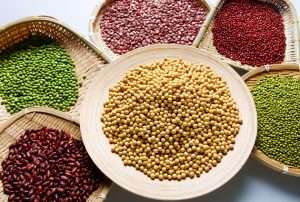Why Is It So Important to Eat Plant-Based Protein?

As the name suggests, the protein that is derived from plant-based food is called plant protein. There is an increasing awareness about its usage in our daily diet because of its marvelous benefits with regards to both health and sustainability purposes. Protein is called the building block of our body as it is needed for growth and development and to repair the wear and tear of the body. Also, protein helps in building muscles. Hence it becomes so important to consume protein-based food in our daily diet. Although animal proteins are complete proteins they contain all essential amino acids that are needed. in our diet. But plant proteins have been linked to a lower risk of stroke, heart disease, and early death compared to animal proteins.
Trending diets
We see that more and more people are nowadays following a vegetarian or a vegan diet. They are shifting from animal products to plant-based products as there is an array of more fortified and nutritious plant-based foods available. The right type of plant-based foods can be an excellent source of protein and other nutrients with fewer calories than animal products.
Here are some examples of plant-based protein sources:
1) Tofu – Soy products are among the richest sources of protein in the category of plant-based protein diet. The specialty of tofu is that it takes the flavor of any dish it is prepared in. People can try tofu as a meat substitute in some dishes. Soy products contain a good amount of calcium and iron also which become an additional healthful substitute for dairy products.
2) Lentils- lentils are a great source of protein. Cooked half cup of. lentils contain 8.84gms of protein. It can be added to our lunch or dinner routine.
3) Chickpeas- These are high in protein. Half a cup of cooked chickpeas contains 7.25gm. Many dishes can be cooked with boiled chickpeas like hummus, shawarma, salads, falafel, etc.
4) Peanuts– peanuts are protein-rich food and contain good fats which are good for heart health. The half cup contains around 20.5gms of protein. Peanut butter is also a rich source of protein with 3.6gm per tablespoon.
5) Almonds – It contains 16.5gms of protein per half cup. Almonds also contain a good amount of vitamin E which is very good for the eyes and skin.
6) Quinoa- It is a grain with very high protein content. One cup of cooked quinoa contains 8gms of protein. It is also a rich source of iron, fiber, magnesium and manganese. Quinoa can be used as a substitute for pasta in soups and stew
Hemp seeds, beans with rice, potatoes, and protein-rich vegetables are some more plant protein examples.
The Health Benefits of Plant Protein
Weight management
Foods high in fibre content provide nutrients as well. Vitamins are abundant in vegetables and whole grains. A minimum of five servings of fruits, vegetables, and whole-grain grains per day is sufficient. Plant-based foods not only provide essential nutrients to the body, but also aid in weight management.
The Fiber Advantage In Plant-Based Proteins
Plant-based protein is high in fibre, which is beneficial to the body. Fibre, also known as roughage, does not break down but instead passes through the digestive system absorbing water and promoting bowel movement. Vegetables, fruits, whole grains, and legumes contain these fibres. The types of fibres are soluble & insoluble fibre.
Soluble fibre: It disperses in water. Bacteria in the digestive system ferment it. It becomes jelly-like as it disbands and gets absorbed.
Insoluble fibres : These remain in their original form but can be fermented by bacteria in the colon. Plant foods contain unequal amounts of soluble and insoluble fibre. Insoluble fibre transports bulk through the digestive tract and regulates acidity in the intestine.
It aids in the elimination of waste products and prevents constipation. Insoluble fibre prevents microbes from producing substances that cause colorectal cancer by maintaining a balanced ph level in the intestine. Aside from fruit skins, whole-wheat products, wheat bran, corn bran, nuts, and seeds, dark green leafy vegetables are high in insoluble fibre. Kidney beans, pinto beans, Brussels sprouts, broccoli, spinach, zucchini, apples, oranges, grapefruit, grapes, prunes, oatmeal, and whole-wheat bread are all high in soluble fibre. Fiber is important for digestive health. It reduces insulin resistance and may lower the risk of developing certain cancers.
Enhances Metabolism
Another reason plant-based protein powder is superior is how it interacts with your metabolism. If you want to lose weight, eating more protein will help you achieve your health goals. As the body works to metabolize the fibre intake, the extra stored fat is burned off. The body benefits from fat burning while acquiring the essential nutrient. Plant-based proteins have been shown to increase metabolic rate, reducing fat mass, body weight, and insulin resistance.
Helps get rid of allergies
Whey is a great source of protein for muscle building, but it can cause a severe allergic reaction. Let’s take a closer look at the symptoms of these allergies. Certain enzymes separate milk into two distinct proteins, casein and whey. Fats, carbohydrates, and water content are removed during further processing. The first processing yields a concentrate containing lactose. Almost all lactose is removed during the second processing step. We obtain whey isolates during the second round of processing. Unlike concentrates and isolates, the third and final round produces whey hydrolysates, which are sometimes used in supplements.
Some users are even sensitive to whey hydrolysates. This is known as lactose intolerance, which is a carbohydrate found in whey. Lactose intolerance affects approximately 75% of the world’s population. The body is unable to break down lactose due to a lack of an enzyme called lactase.
Bloating, gas, cramping, abdominal pain, and diarrhea are all possible symptoms. Inflammation would result from an immune response. Nasal congestion and mucus accumulation are two symptoms of allergies. People with extremely sensitive digestive systems may experience irritated skin or watery eyes simply by touching whey protein powder. Plant proteins do not cause widespread allergic reactions. Only a few plant proteins, such as soy, have been identified as potential allergens. Lactose intolerant people should consider plant-based protein.
Contains plenty of Vitamins & Minerals
Plant-based protein powders provide vitamins, minerals, and antioxidants that animal-based protein does not. Plants are the only source of phytochemicals and fibres. Plants are a rich source of carotenoids, glucosinolates, and flavonoids, which perform antioxidation and free radical neutralization. Many diseases, including obesity, hypertension, and type 2 diabetes, are prevented by plant nutrients. It has also been shown to inhibit tumor growth in certain types of cancer. Plants’ high nutrient content helps to lower the risk of chronic diseases such as obesity, hypertension, and type 2 diabetes.
Absence Of Alkalizing Anomalies
pH is an important indicator for determining the acidity or alkalinity of our bodies. Hydrochloric acid is produced in the stomach and aids in food digestion. It is not harmful to the stomach; however, if it is produced in excess, it can cause stomach pain due to acidity. Alkalinity is water’s ability to resist changes in pH that would cause it to become more acidic. A pH of 7 between 1 and 14 is considered normal. A value less than 7 indicates an increase in acidity, while 1 indicates extremely high acidity. Similarly, 14 indicates a high alkalinity level. The pH of the human body is 7.4. Meat and carbohydrates are more acidic, causing the pH of the body to rise rapidly. Minerals from our bones are taken and used to counteract it. Plant-based foods can help reduce acidity. Plants’ green parts (chlorophyll) provide alkalinity as well as vitamins and minerals. Plant-based proteins aid in the pH balance of our bodies.
Absence of Growth Hormones & Antibiotics
Farm animals are frequently injected with antibiotics and hormones. None of these substances are found in plant-based proteins. Antibiotics are given to livestock animals to prevent infections from spreading in the environment. Because of the breeding methods used in farm-bred animals, animal-based foods cause antibiotic-resistant infections. Organic food sources, which are free of harmful chemicals, are a healthy alternative.
Low Saturated Fats
Saturated fats raise cholesterol levels in the blood and cause artery clogging. Saturated fats are abundant in meat, dairy, and eggs. Unsaturated fats found in nuts and seeds protect the heart. Mono-unsaturated fats have additional health benefits. Mono-unsaturated fats are abundant in avocados, almonds, cashews, and peanuts, as well as oils derived from seeds such as peanut, olive, canola, sunflower, rice, and soybean. Vegetable oils, nuts, and seeds contain polyunsaturated fats. Plant-based foods are high in polyunsaturated and monounsaturated fats, which are beneficial to health. Many heart problems and diseases are caused by saturated fats.
Plant based proteins are wholesome
Hemp seeds provide a ‘complete protein,’ containing all 9 essential amino acids found in the human diet. It is also high in omega-3 fatty acids. Protein intake can be increased by incorporating it into salads and smoothies. Quinoa is another food that contains essential fatty acids in addition to amino acids. People who live near the coast can attest to the high nutrient content of sea vegetables such as seaweed, kelp, and wakame. Soups and salads can benefit from the addition of wakame. Kelp noodles can be found in stores. Many varieties, such as hemp seed, kelp, wakame, and seaweed, are ‘complete’ protein sources.
Calorie Control
Plant foods provide an adequate number of calories when compared to animal-based foods. One cup of chopped chicken pieces contains 231 calories and can be substituted with nine carrots, which contain 225 calories. 236 calories are provided by two cups of peas. Two and a half apples contain 232.5 calories. Plant-based protein can provide the same number of calories as animal-based protein. This is a good option for vegetarians, vegans, and those looking for a well-balanced diet. Plant foods have the same calorie count as animal foods and are comparatively better at providing wholesome health benefits.
Effects On The Environment
The production of plant-based protein does not deplete a region’s natural resources. It requires less land and water than animal farms. Plant wastes are biodegradable and may even be used to enrich the soil. Animal farming wastes can contribute to greenhouse gas emissions that pollute nearby air and water sources. With an ever-increasing population, the demand for meat and dairy products is putting a strain on already scarce natural resources. People switching to more plant-based diets will protect future generations of the human race and the animals that share this planet. Plant-based foods have no negative impact on the sustainability of precious resources required for future generations.
Plix Life is a Mumbai-based company that has mastered the art of delivering good health in the most palatable way. Strength Protein is your perfect workout buddy that can help reinforce your muscle strength and bolster your immunity!
FAQs
1. Is a vegetarian or a vegan diet enough to deliver energy in adequate amounts?
even in terms of providing enough energy during long days of work or workouts, a vegetarian or vegan diet can be compared to an animal-based diet. Plant-derived glucose is used to keep the brain focused during intense workouts, competitions, and long workdays. Carbohydrates are among the most beneficial food sources for maximizing energy for exercise and endurance sports.
2. Isn’t Meat Protein Preferable to Plant Protein?
No! Plants contain a variety of vitamins, minerals, fibre, and phytochemicals that are safe for consumption from both short-term & long-term perspectives. Whereas, there are some risks associated with unrestricted consumption of animal-based foods. It may result in chronic diseases such as obesity, cancer, and diabetes. It is healthier to consume fewer animal products or to switch completely to a vegetarian or vegan diet.
3. Don’t I need more protein from meat as an athlete?
Many nutritionists have recognized that plant-based protein can provide the necessary protein for muscle strengthening as well as repair and restoration. Plant-based proteins meet the nutritional needs of performance and endurance athletes!
4. How does Strength 25G Plant Protein Powder help?
This protein powder contains a potent secret combination that you’ll love: Pea Protein and Brown Rice Protein. These proteins are blended in the optimal ratio so that your body receives all nine essential amino acids from a single scoop. These nine amino acids work together to promote tissue growth, improve immune function, and keep your energy levels high. This protein is simple to digest thanks to natural digestive enzymes. It aids the glycemic index (GI) in starting digestion, making food easier to digest, and increasing nutrient absorption. This aids digestion and eliminates digestive discomfort such as gas, bloating, and indigestion.
5. How Should I Take Strength Vegan Plant Protein?
Strength tastes best with 300 mL of ice-cold water or nut milk. To make a healthy vegan protein smoothie, add organic fruits such as bananas, berries, and nuts.













